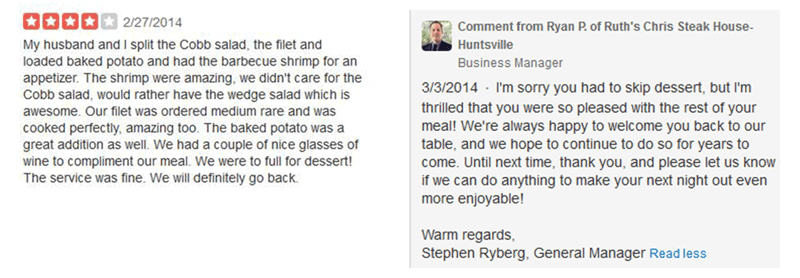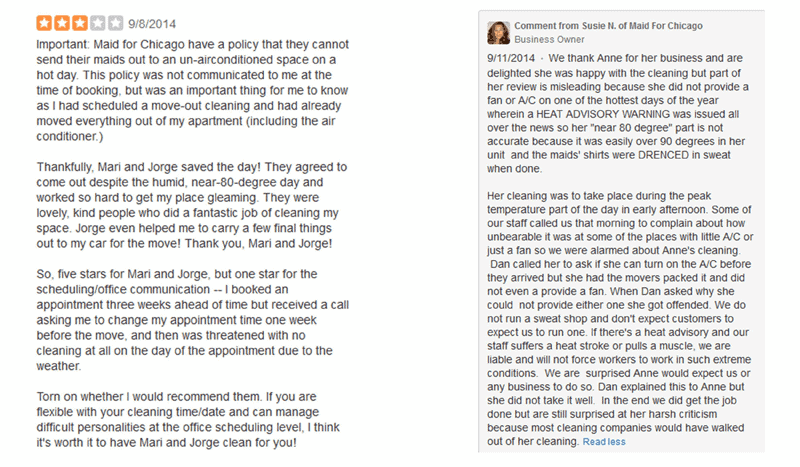There has been much written about the best approach for responding to negative reviews but it’s also important for businesses to craft thoughtful responses to positive and neutral reviews.
With a careless response to these reviews, you risk alienating customers who were initially positive or neutral and willing to provide repeat business. Because you’re also reaching potential customers who are browsing reviews, a poor response puts you in a bad light and threatens future business.
In the below examples of 3 and 4 star reviews and associated responses, you’ll see how some businesses ruin a positive experience through flawed responses, while others use the review response as an opportunity to capitalize on the customer’s initial enthusiasm and drive repeat business.
As you respond to reviews, be sure to avoid these five major sins:
1. Criticizing Reviewers for Not Giving a 5-Star Rating
2. Painting the Business as the Victim
Imagine a couple rents a place through a service like Airbnb or VRBO. They have a great experience, write what they believe to be a positive review and are probably expecting to hear “Thanks, come again” or something along those lines.

Ouch.
From the customer’s perspective, a 4 star rating usually indicates an excellent experience, just not perfect. In the example above, there could have been minor issues that the reviewers felt were not worth mentioning or, the reviewers could be like the teacher who never gives a perfect score.
Not only does the owner criticize the customers for not giving a 5-star rating, but also implies they have now hurt future business because of the score. Ironically, it’s probably the response rather than the rating that would have the most negative impact on future business.
Contrast the response above with this one:

This upbeat response reinforces the customer’s positive experience, enthusiastically welcomes a prompt repeat visit (their next night out) and solicits feedback to further improve (how can we get to 5 stars).
While business owners crave five stars so the business ranks higher or displays more frequently, customers just want to share their experiences and perhaps help others make a more informed decision. You may believe the reasons for deducting a star are trivial, but the trick is to not let your quest for a 5 star review negatively influence your reaction. However you respond, you should never make a customer regret leaving a positive review.
3. Dismissing/Ignoring Reviewers’ Concerns
4. Failing to Apologize
In the below scenario, although the customer thought the flowers were beautiful, they weren’t what she ordered. The business owner doesn’t apologize, dismisses her concern with the excuse that they were busy, and focuses more on his problems than the customer’s point.

In contrast, this business owner immediately apologizes, acknowledges the customer’s concern (framing it in the desire to send the freshest flowers), offers a clear method of contact, and a new bouquet. This is a textbook approach to recapture the customer’s initial enthusiasm and encourage future purchase.

It’s amazing how many businesses don’t respond to 3 star reviews. These customers often say they would be willing to give the business another try; so, your review response is the perfect opportunity to pull customers back in and convert them to fans.
In addition, while 3-star reviews aren’t considered positive from a ratings perspective, they are often a goldmine of constructive criticism that can help your business. If you spot trends related to slow service, inaccurate orders, poor communication, and so on, these are fixable issues.
5. Demeaning the Reviewer
While it’s perfectly appropriate to correct misconceptions or factual errors, demeaning a customer is unprofessional and not helpful.
In the below review, the customer is actually thrilled with the “5 star” cleaning. The owner’s response fails to capitalize on that enthusiasm and instead descends into a rant that surely resolves any indecision the reviewer had about recommending them. It’s hard to imagine the business objective for this response to the customer’s review.

Besides avoiding these five sins, remember to follow the three Ps of review responses: Be Prompt. Be Personal. Be Professional.
Be Prompt – Responding to reviews within one week ensures the experience is fresh in the reviewer’s mind and provides a new touch point which may generate referrals or repeat visits.
Be Personal – Mention the reviewer by name, and/or reference something from the review.
Be Professional – Avoid petty references, personal attacks and rants.
As an aside, just as with negative reviews, it’s worth doing a sentiment analysis to ensure the features you’re promoting match your customers’ experience. You’ll also want to be sure you’re capturing all the positives customers value – they may notice some advantages that are not in your marketing message.
As you respond to your reviews, particularly those of 3 and 4 stars, it’s important to think about the business objective for your response. With a thoughtful response, you can build on the positive aspects of your customers’ experience and drive repeat business.
Your response to a customer review is a lasting impression – be sure it’s a positive one!
Read this article as it was published on the CMSwire website.




